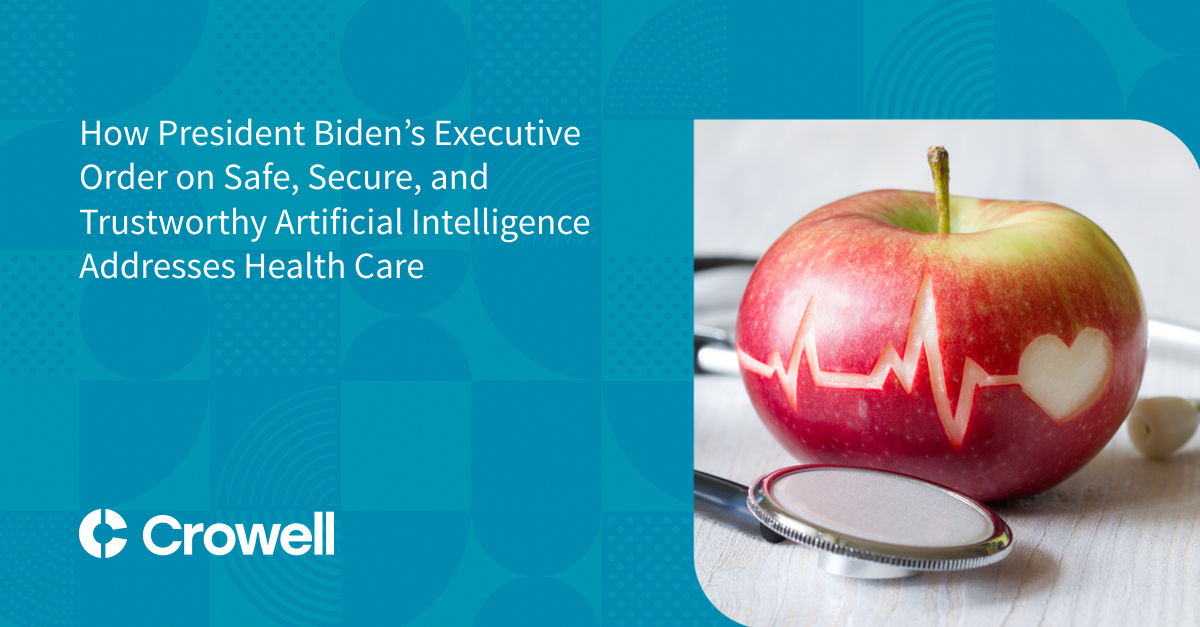On October 30, President Joe Biden issued Executive Order (“EO”) 14110 titled “Safe, Secure, and Trustworthy Development and Use of Artificial Intelligence,” which introduces a policy framework aimed at managing the risks associated with artificial intelligence (“AI”). The EO directs agencies to regulate the utilization of AI systems in healthcare and guides AI innovation across various sectors, including health and human services. Simultaneously, the Office of Management and Budget (OMB) unveiled a draft memorandum to outline new agency requirements concerning AI governance, innovation, and risk management, soliciting public feedback by December 5, 2023.
The EO delineates eight key principles and priorities to promote and govern AI usage: ensuring the safety and security of AI technology, fostering responsible innovation, competition, and collaboration, supporting American workers, advancing equity and civil rights, safeguarding consumers, patients, passengers, and students, protecting privacy and civil liberties, overseeing the federal government’s AI utilization, and enhancing U.S. leadership globally in the responsible development and deployment of AI technology.
It encourages independent federal agencies to leverage their existing authorities to enforce applicable requirements safeguarding Americans from fraud, discrimination, privacy threats, and other AI-related risks in sectors such as health, education, transportation, and communication. The EO includes provisions specifically targeting the Department of Health and Human Services (HHS) to craft policies governing AI’s use in healthcare, expanding beyond the current efforts of the U.S. Food and Drug Administration (FDA) and the Office of the National Coordinator for Health Information Technology (ONC). Anticipated guidance may cover areas like nondiscrimination, privacy of health data in AI applications, and patient safety reporting.
Furthermore, the Biden Administration expressed its intent to collaborate with Congress on AI legislation, emphasizing the significance of preserving individuals’ privacy when deploying AI tools and technologies and urging the enactment of comprehensive data privacy laws.
While this summary focuses primarily on the health and human services aspects of the EO, it underscores the broader AI governance policies with implications across multiple sectors, including healthcare. Notably, the EO mandates the Secretary of HHS to:
- Establish an HHS AI Task Force and devise a Strategic Plan for responsible AI deployment in the health and human services sector by January 27, 2025, encompassing various areas such as predictive AI technologies in healthcare delivery, equity principles integration, and privacy and security standards implementation.
- Develop a quality strategy by April 27, 2024, to assess the quality levels of AI-enabled technologies in healthcare and ensure premarket assessment and post-market oversight.
- Advance nondiscrimination compliance by the same date by facilitating understanding and compliance with federal nondiscrimination laws in relation to AI within the health and human services sector.
- Set up an AI Safety Program by October 29, 2024, in collaboration with patient safety organizations to address clinical errors resulting from AI deployment in healthcare settings.
- Formulate a Strategy for regulating AI use in drug development by the same date, defining regulatory objectives and identifying necessary resources for effective implementation.
Moreover, the EO establishes the White House Artificial Intelligence Council to coordinate inter-agency efforts in formulating and implementing AI-related policies. OMB’s companion guidance aims to establish AI governance structures in federal agencies, promote responsible AI innovation, enhance transparency, protect federal workers, and manage AI-related risks. Stakeholders in healthcare and technology sectors engaging with or planning to adopt AI solutions are encouraged to participate in the public comment process outlined in the Federal Register notice to contribute to advancing AI innovation and addressing healthcare-specific challenges.
In conclusion, the EO presents a comprehensive vision for the responsible use and governance of AI, impacting stakeholders in healthcare significantly. It offers avenues for government engagement and grant funding opportunities, with the health and human sector provisions slated for implementation in the coming months. Stakeholders should monitor agency-level developments and updates from relevant entities like the FDA, ONC, CMS, and OCR to stay informed. Crowell will continue to provide insights as federal agencies work towards implementing the EO’s directives. For further details on the EO, reach out to the listed professionals or your regular Crowell contact.






